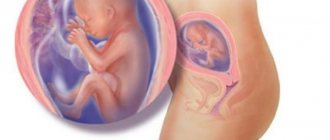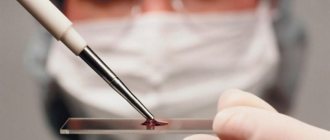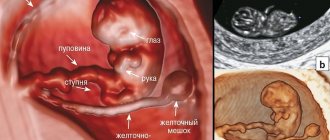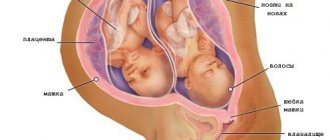From the 23rd week of pregnancy, a period begins when the main organs of the unborn child are almost formed and the active growth of subcutaneous tissue begins. The sixth month of pregnancy also becomes more prosperous for the expectant mother - the condition of the skin and hair improves, appetite increases, and mood normalizes.
In the development of the fetus, the stage of motor activity begins, and its movements are already clearly felt by the woman.
Fetus at 23 weeks of gestation
Your baby is “getting smarter” at an enviable speed: from the second to the fifth month of pregnancy, the weight of his brain has increased by more than 10 times! Now he weighs an average of 20-24g and within two weeks he will weigh five times more! For the normal course of these important processes, a sufficient supply of oxygen to the small brain is necessary. Therefore, be sure to take daily walks, especially since now is the most favorable period for this. And eliminate any stress - it can also lead to oxygen starvation of the baby.
The fetus at the 23rd week of pregnancy is already quite developed and formed, although, of course, its preparation for extrauterine life will continue until the very last day. But the child’s digestive system is already fully formed: the stomach, esophagus, liver, pancreas, large and small intestines - everything works. So, the baby swallows amniotic fluid, making up to 60 breathing movements per minute and at the same time training his lungs (by the way, this can cause hiccups in the fetus, so that the mother sometimes feels rhythmic shuddering inside). The liquid enters the esophagus, sugar and water are synthesized from it, the original feces begins to form here (which will also consist of bile), the pancreas produces insulin and does not stop improving.
Brown adipose tissue continues to accumulate under the delicate skin, which is now still quite wrinkled. At the 23rd week of pregnancy, the spleen comes into operation: it not only produces blood cells, but also controls their quality, destroying everything that has not passed the test.
If you recently had an ultrasound, you could already see the sex of the baby if he successfully turned towards the sensor. By this time, the baby’s genitals have already differentiated, the boy has a scrotum, and the girl has ovaries, which store a million-strong supply of eggs for future offspring.
At the 23rd week of pregnancy, your baby weighs about 500 g and has an average height of 29 cm. His nails have already formed, and the lanugo (fluff on the body) is beginning to darken.
Some scientists believe that from this time the baby begins to dream: they detected the appearance of the REM sleep phase in the fetus. The little one spends a lot of time sleeping, but often wakes up - almost every hour, however, not for long.
Fetal development
The 23rd week of pregnancy, like the entire 6th month, is accompanied by rapid development of the fetus and weight gain.
The main parameters of fetometry (ultrasonic sizing) are indicated in the table:
| Parameter | Head circumference, mm | Weight, g | Height, cm | Foot length, mm | Distance between the parietal bones of the head (biparietal diameter) |
| Girls | 218 | 580 | 31 | 41 | 59 |
| Boys | 600 |
During this period, the following changes occur in the development of the unborn child:
- nail plates are fully formed;
- the vellus hair on the head darkens;
- meconium (original feces) is formed in the intestines;
- sweat glands appear in the skin;
- the synthesis of surfactants begins - active substances that promote the formation of the fetal lungs (their normal function is possible only at 34-38 weeks);
The maturation of the nervous system also continues. The fetus begins to react to external stimuli. So, if you put a bright lamp or flashlight on the skin of the abdomen, the baby moves restlessly.
Within a week, he will begin to open and close his eyes when exposed to acoustic influences. Therefore, from this week on, experienced midwives advise actively communicating with the baby - talking, singing lullabies to him, calling him by name, since he hears the mother’s voice and can respond to it.
At week 23, kidney tissue continues to form. Fluid in the bladder is detected already at the 20th week of pregnancy, and fetal diuresis gradually increases. Low urine density promotes efficient water exchange in the fetus-amniotic fluid-mother system.
Baby development at 23 weeks of pregnancy
The liver has not yet fully formed. From the 20th week until the onset of birth, its volume increases 17 times. The left hepatic lobe at this stage of a child’s life is always larger than the right.
At the end of the 23rd week, proteolytic activity, or the process of enzymatic breakdown, is noted in the pancreas. However, some enzymes (for example, lipase, necessary for the digestion of fats, amylase, with the help of which starch is broken down) are still missing.
Fetal movements usually increase in the morning or before bedtime, and in some babies at night. It is important for a pregnant woman to maintain a day-night routine, since its violation can affect the daily activity of the newborn subsequently. The baby’s skin still looks red and wrinkled, but from the 24th week the active accumulation of subcutaneous fat will begin and it will smooth out.
The 23rd week of pregnancy, during which fetal development is characterized by inadequate functioning of many organs, is marked by another important event.
From this point on, if there is a premature birth, there is a chance that doctors will be able to deliver the premature newborn. The prognosis for such a fetus is more favorable if it is large. However, his lungs will not be able to open on their own and he will need Dexamethasone.
Feel
Fetal movements become more and more pronounced. If earlier you could still doubt whether it was the baby moving or the intestines working, now you can unmistakably recognize signals from the outside and sometimes you can even determine what exactly the baby is doing: he is playing, rolling over, or perhaps hiccupping. The baby’s movements give the mother a lot of joy until he kicks her in the ribs, but what is of little joy is that the peak of his activity occurs in the evening and at night, when the woman is trying to sleep. If the baby is very excited, try to lull him to sleep: sing a lullaby, stroke his tummy.
A growing belly will cause more and more discomfort every week: it is very likely that heartburn will appear. If the problem has already manifested itself, then start looking for your own “cure” for the internal fire. Some people save themselves with seeds, some with milk, and for others, a cube of chocolate helps. Just remember that you can’t extinguish heartburn with soda, and you shouldn’t: it will only intensify the burning sensation and make attacks more frequent.
The older the baby grows, the harder it will be for the mother to breathe. The uterus props up the sternum and compresses the lungs, preventing them from functioning normally. This is not scary, but it is important to learn how to get oxygen for yourself and your little one. Start learning different breathing techniques that will help you in the future during childbirth.
The bladder is also under increasing pressure, so trips to the toilet will become more frequent. To prevent them from interfering with your night's rest, try to limit your fluid intake after 6 pm. But drink enough throughout the day: if you experience swelling, it is not due to drinking. A slight swelling is physiological at such a time, since additional fluid is necessary to nourish the placenta. But if the swelling is too severe, then it is necessary to significantly limit the consumption of salt and salty foods. In any case, pay attention to this and try to avoid excess salt in your food. Among the new pregnancy companions, you may be surprised by the redness of your hands, but this is also a temporary phenomenon, which is to blame for hormonal fluctuations.
While time still allows, devote it to yourself, your beloved. Moreover, often in the second half of pregnancy, a woman’s skin needs special care: it dries out, can peel off, and overstretch, so do not forget about preventing stretch marks and daily moisturizing the skin.
Maintain hygiene in everything. This is also especially true for the breasts (you may notice colostrum leaking from the nipples) and the mouth (dental health often worsens during this period due to high calcium consumption).
Mom's feelings
The tummy continues to grow, and you begin to feel a little clumsy - due to the shift in the center of gravity, the gait becomes unstable, you can catch surrounding objects with your tummy. There is nothing wrong with this; such phenomena are typical for all pregnant women. If weakness and dizziness are too strong, accompanied by visual disturbances, swelling and headaches, you should urgently consult a doctor to exclude late gestosis.
At 23 weeks of pregnancy, your weight gain should be between five and seven kilograms; if you gain much more, pay attention to whether you have swelling, this could also be a sign of gestosis. Swelling at this stage worries many mothers, but it should be moderate and not cause severe discomfort. Weekly weight gain is about half a kilogram.
The baby learns to breathe and swallow by swallowing amniotic fluid. Because of this, the baby often develops hiccups - it seems to jump in the tummy. There is no need to worry about this; fetal hiccups are completely normal.
Due to hormonal changes in a woman's body, the skin becomes drier and thinner, which is why you may notice reddening of the palms, the skin may itch and itch. All these changes can lead to the formation of stretch marks and stretch marks. Now is the time to start actively caring for your skin - because with proper systematic care, stretch marks and stretch marks can be completely avoided. It is better to take care of your skin using special products for pregnant women - they do not contain harmful substances that can affect the baby.
But hair and nails become more beautiful and stronger - this is also the influence of hormones. Every day you will notice that your hair becomes thicker and shinier, your nails are stronger and more beautiful. Enjoy this gift of nature - because during pregnancy you are more beautiful than ever!
Many expectant mothers may feel worried about themselves and their baby. To reduce anxiety, walk in the fresh air more often, try to communicate with positive people, go to a playground for children - there you will meet mothers who have already gone through pregnancy and childbirth, they will reassure you and share invaluable experience. In addition, it would be a good idea to sign up for classes for expectant mothers - they are usually recommended for attendance after 32 weeks of pregnancy.
If this is your second pregnancy
The second time, mothers endure pregnancy much more calmly - after all, honey mushrooms are already there, everything is clear. Many people complain that the second time the discomfort and pain is more painful. The baby begins to move much earlier than at 20 weeks, so by 23 weeks he is usually very active and better coordinates his movements and rolls. In general, during the second pregnancy the baby will start doing everything a little earlier than during the first.
23 weeks pregnant with twins
Pregnancy with twins requires more careful monitoring, so you will visit the antenatal clinic weekly. Since a multiple pregnancy usually ends in birth earlier than a normal pregnancy, the babies develop faster in the mother’s tummy. The baby's weight may be less than expected at this time, but not by much. Of course, the 23rd week of pregnancy with twins will tire the mother much more; she needs more rest. Back pain can be quite severe - the tummy of a mother with twins is usually quite large by this time.
Pain
A lack of calcium can cause cramps in the calf muscles, so be sure to take extra calcium or increase the amount of calcium in your diet. Pain associated with weight gain increases. Under the weight of the uterus and fetus, the back, lower back, and tailbone hurt. In addition, as labor approaches, the pelvic bones will soften and move apart more and more, preparing to make way for the baby.
Consider your position and learn to do familiar things in a new way: bending, squatting, sitting, getting out of bed. It was high time to give up heels and also learn new comfortable sleeping positions: sleeping on your back and stomach is now uncomfortable and unsafe.
Abdominal pain at 23 weeks of pregnancy is not as bad as before: in this trimester it is rarely caused by something dangerous. Most often, the stomach hurts now due to muscle tension, which is especially noticeable with sudden movements and spasms: sneezing, coughing, laughing.
To prevent your tummy from burdening you with its weight, start wearing a prenatal bandage after consulting your doctor about this. Remember to control your posture, distributing the load evenly.
Belly at 23 weeks pregnant
In addition to the characteristic abdominal pain (including cramping, as read below), you can observe some changes in it. In particular, this concerns the darkening of the strip running from the navel to the bottom. The brown line in the middle of the abdomen appears due to increased melanin production. For the same reason, nipple halos on the chest darken, and age spots may appear on the face and body. Don't worry: like many other temporary phenomena, these will disappear soon after childbirth.
The abdomen gradually increases in size, which entails stretching of the skin. This often causes itching and even a rash on the skin - maintain its elasticity with cosmetics. Olive oil works well as a moisturizer.
23 week pregnancy video
23 week pregnancy photo
You should be alerted to pain in the abdominal area only if it intensifies and becomes more pronounced or if it is accompanied by other alarming signs (fever, chills, spotting, fainting, vomiting). Such pain is a reason to immediately consult a doctor. But if you were tormented by a headache, now it will most likely disappear.
Uterus
At the 23rd week of pregnancy, the uterus rises already at a level of 4 cm above the navel. From this period, she begins to train before childbirth, which you feel with mild cramping pain. They can be isolated or continue over a period of time. But normally such pain is not accompanied by other symptoms. These are Braxton Hicks contractions that may get worse after intercourse. In moments of false contractions, you can lie on your left side so that the uterus calms down.
If they grow and become more frequent (you experience 5 contractions per hour or more), then you need to urgently call a doctor.
Your body
A hippopotamus, an elephant and a round baby with legs – what words do some mothers reward themselves with! Some with humor, others with a slight longing for the lost chiseled figure. Never regret anything. Every pregnant woman is beautiful in her own condition.
Photos of bellies (click to enlarge):
The fundus of the uterus is now located just above the navel, which is gradually beginning to protrude outward. If you wear a piercing in your navel, it's time to take out the earring. Don’t worry: theoretically, the puncture site can become overgrown, but in practice this happens very rarely.
Feel
Doctors consider the second trimester to be the calmest and most prosperous period of pregnancy. Many women agree with this. Early toxicosis has passed for a very long time. The baby’s kicks are not too strong yet, they please and give positive emotions. My general health is simply excellent. However, unpleasant manifestations are also possible:
- headache;
- constipation;
- heartburn;
- swelling of the arms, legs, face;
- dizziness and weakness;
- increased fatigue;
- bleeding gums;
- periodic cramps (usually cramps on the inside of the calves or feet);
- initial stage of varicose veins;
- inability to quickly concentrate and switch from one thought to another.
It is quite possible to overcome such troubles. It is enough to be attentive to your diet, devote enough time to sleep and rest, and keep work and household diaries. In addition, it is important to visit the dentist and antenatal clinic doctors on time.
Now you feel the urge to urinate every now and then. This sensation will increase until childbirth, as the growing uterus puts pressure on the bladder and does not allow a large amount of urine to accumulate.
Pigment spots may appear on your face. This is unpleasant, but it is impossible to change this situation. A thick layer of cosmetics can simply tire you and worsen your skin condition. So just think about how after giving birth, all the excess pigmentation will definitely disappear.
At week 23, you may be surprised to feel nauseous shortly after eating. But early toxicosis ended long ago? Everything is understandable. Sometimes the uterus can put a little pressure on the bile ducts, and this interferes with proper digestion. Consult your doctor about solving this problem.
Pain and complications
Some conditions during pregnancy should raise alarm. For example, any severe pain in the abdomen and/or lower back. Please note that these should not be nagging sensations that rarely occur and pass quickly. When your stomach really hurts, only a doctor can help. Especially if contractions begin along with pain. If the uterus now rejects the fetus and premature birth occurs, even modern medical technologies are unlikely to save the child’s life.
Preeclampsia (late toxicosis) is considered a serious and dangerous complication of pregnancy in the second and third trimester. Its main symptoms are persistent swelling, excess weight, protein in the urine and blood pressure disorders. If gestosis is recognized and treated in time, you will prevent many complications in the third trimester. Read more about late toxicosis here.
Ultrasound
In order not to miss any threats and complications of pregnancy, do not neglect routine examinations with a gynecologist and his referrals for an ultrasound scan, one of which can be prescribed at the 23rd week of pregnancy.
An ultrasound examination will show how the baby is developing, determine its size, which should correspond to the gestational age, and evaluate its motor activity, heartbeat and other vital signs. The specialist will also examine the uterus (its size and condition) and the placenta (mainly its location). Do not rush to be upset if, according to the results of an ultrasound, it turns out that the placenta is located too low: up to the 8th month of pregnancy, it can still rise due to the growth and expansion of the uterus.
At this stage, the external genitalia of the fetus are already clearly visible, and if during the ultrasound it unfolds successfully, then it will be possible to determine the sex of the child. However, one should not take the “verdict” as final, because an error always reserves the right to be.
Determining the sex of the child
The sex of the baby can be determined during the second planned ultrasound, which is prescribed at 20-22 weeks. This examination is performed mainly to detect congenital abnormalities that appear in the later stages of pregnancy.
An ultrasound at week 23 may be prescribed if a planned examination was missed or the doctor has doubts about its results. In female embryos, the production of sex hormones begins at 3 months. From the 16th week, active sexual differentiation of the fetus already occurs, but due to poor visualization on ultrasound, it is not always possible to determine the sex of the unborn child.
There are also “folk” methods that allow you to do this based on external signs, for example, if the stomach has a “sharp” elongated shape, then this indicates that the woman is carrying a boy, and if a pregnant woman has a craving for sweets or the condition of her skin has worsened, she will be born girl.
However, these beliefs do not have any evidence base and in many cases lead to the exact opposite result.
Analyzes
Ultrasound is not the only examination that a pregnant woman is sent for. Throughout the entire period, she has to undergo many different biochemical tests, in particular a general blood and urine test, a test for sugar, blood clotting, hCG and determination of progesterone levels, and others.
Indicators of various markers can warn the gynecologist in advance about the development of undesirable processes in the body of his ward (in particular, exacerbation of genitourinary infections), as well as about possible complications in the development of the fetus. Causes for concern are the presence of protein and salts in the urine of a pregnant woman, elevated sugar levels, low or high levels of hCG, and a lack of progesterone in the woman’s blood.
Glucose testing is of particular importance now because it can indicate an increased risk of excess weight gain in the fetus. If the glucose level is too high, the expectant mother will be put on a diet and, possibly, will be prescribed specific treatment.
The hemoglobin level does not lose its relevance throughout pregnancy. Regular testing allows you to prevent and treat anemia, which is very often observed in pregnant women and is an unfavorable sign.
Remember that a single test cannot be the basis for making any diagnosis. Usually, pathology is indicated by poor results of both urine and blood tests at the same time. But in any case, it is necessary to take a second laboratory test to verify the results. Therefore, never make premature conclusions.
Discharge at 23 weeks of pregnancy
You may need to take a vaginal smear to check for infections. You should ask your doctor about this yourself if you notice suspicious discharge: yellow, greenish, earthy, bloody, white, mucous, lumps, curdled, bubbling, flaky, with a pungent odor. Often during pregnancy, women experience thrush or colpitis, but other infectious diseases are also possible. Some pathogens can infect the fetus during its passage through the birth canal, others - while still in utero, so treatment must be carried out as early as possible.
Transparent watery discharge at 23 weeks of pregnancy does not require any intervention, but only hygiene, if it does not smell of anything and is not accompanied by symptoms such as itching, burning, swelling and irritation of the genitals, painful urination, and increased body temperature.
Meanwhile, it is important not to confuse normal physiological discharge for this period with leakage of water, which should be a reason to immediately consult a doctor. The easiest way to distinguish one from the other is to use a special pharmacy test for water leakage.
Bloody discharge, which caused fear and fear in the first trimester, is now no longer so scary: in the second trimester, the risk of miscarriage is significantly reduced. And yet, even in the absence of a threat of miscarriage, “spotting” may occur at 23 weeks of pregnancy. This happens, for example, with cervical erosion. Spotting in this case appears after a gynecological examination or sexual intercourse and is not accompanied by signs characteristic of increased uterine tone.
Sex
And, nevertheless, you should not refuse sex at 23 weeks of pregnancy if there are no direct contraindications to this. For many women during this period, all senses become more acute, sensitivity and the number of erogenous zones increase, libido increases and sexual desire increases. Therefore, sex during pregnancy can open up new, previously unknown facets of each other for both spouses. Moreover, often the expectation of a common child brings the expectant mother and father much closer together, forcing them to look at each other and the family in a new way, to experience different feelings.
It is very undesirable (or rather, completely prohibited) to change your sexual partner during this period. Life situations, of course, are different, but the vaginal microflora is very sensitive to foreign microorganisms, which can provoke the development of various dangerous infections in a woman.
Doctors have different opinions regarding oral and anal sex. It should be said that many couples practice different types of sex during pregnancy and are very happy about it. The main thing, they say, is to maintain hygiene and caution. Tenderness and accuracy now will not harm, but positions with deep penetration are better left for later.
Doctors recommend abstaining from sexual intercourse if you have had miscarriages in the past or if you are carrying twins. A low location of the placenta may be a contraindication to sexual activity during pregnancy. And, of course, you will have to completely abandon intimacy if pregnancy is in jeopardy.
Changes in the body
The 23rd week of pregnancy, the development of the fetus during which corresponds to the sixth month of pregnancy, is accompanied by changes in the body of the expectant mother.
Changes:
- improvement in general well-being, hair condition, absence of toxicosis;
- the stomach grows more and more, as the uterus continues to grow and almost reaches the ribs;
- there may be a change in taste preferences, the appearance of poor tolerance to certain foods (for example, fish, milk);
- the skin becomes more elastic, a blush appears on the cheeks due to increased blood circulation in the capillaries;
- enlargement of the mammary glands, in which active growth of glandular lobules occurs; in some pregnant women, colostrum begins to leak from the nipples;
- the excitability of the cortex and subcortical centers in the brain is practically leveled out (in the first trimester the influence of the subcortex predominated), therefore the emotional state stabilizes, increased nervousness and tearfulness, and frequent mood swings disappear;
- the figure becomes more and more rounded, and the gait becomes duck-like due to the natural increase in the load on the spine and a shift in the center of gravity.
The total weight gain during this period is in the range of 3.6-7.2 kg, and in the 23rd week - 0.5 kg. From this moment on, there is an active increase in the weight of the pregnant woman and the fetus.
At the end of the 6th month, the concentration of cholesterol in the blood also increases, but this is a natural process and does not indicate the development of pathology. With the participation of this organic substance, the placenta produces hormones necessary for lactation and maintaining pregnancy.
Nutrition
Recommendations regarding nutrition at 23 weeks of pregnancy remain the same. It is important to ensure that the diet contains fats, carbohydrates and proteins with a predominance of the latter. Fresh vegetables and fruits in season are a must on the daily table; special preference should be given to the green gifts of nature.
Monitor the intake of calcium in the body, eat foods that increase hemoglobin, minimize salt intake and completely give up food chemicals and harmful delicacies: spicy, smoked, pickled, fried, and so on.
Be sure to drink enough liquid, for which purified living water is best suited. Fruit drinks, fresh juices and unsweetened compotes are also useful during pregnancy. Be extremely careful with herbs.
Speaking of sweets. If you really want to, treat yourself to dried fruits and simple nuts (no salt, sugar, unroasted), and even then carefully. You don’t need extra calories now - weight gain should be controlled very strictly. For the same reason, try to minimize your consumption of flour.
Weight at 23 weeks of pregnancy
At week 23, most women already feel increasing weight. Because of this, they may experience some inconvenience: sleep disturbances, headaches, pain in the spine and legs, shortness of breath. Weight gain is inevitable during a normal pregnancy, but there are certain limits beyond which you cannot go, so as not to provoke additional problems now, during the labor period and after childbirth.
Extra pounds promise trouble not only for the mother, but also for the unborn child. Therefore, be sure to carry out regular weigh-ins and try not to go beyond what is permitted. By 23 weeks of pregnancy, you could normally have gained 5-7 extra pounds. If your gain exceeds this figure, consult your doctor about weight correction.
Recommendations
At 20-23 weeks of pregnancy, metabolism accelerates and the symptoms of toxicosis finally disappear, so the pregnant woman feels an improvement in appetite. The additional calorie requirement is already 500 kcal, but it is important that the energy deficit is replenished through different foods and a balanced diet.
You should not “lean” on any particular type of food, especially if it belongs to the category of those that often cause allergies (citrus fruits, tomatoes, nuts, eggs, fish and others), since in the future it may manifest itself in the child.
If a pregnant woman is diagnosed with varicose veins, the following recommendations must be followed:
- undergo timely consultations with an angiosurgeon and obstetrician-gynecologist, as well as control of a coagulogram (usually prescribed once every 2 weeks);
- adhere to a special diet (avoid fatty foods, eat more vegetables, berries and fruits that have an anti-sclerotic effect - raspberries, hawthorn, strawberries, sea buckthorn, persimmon);
- avoid constipation, if necessary, take laxatives prescribed by your doctor;
- wear shoes with flat, flexible soles (which all pregnant women should do in the second trimester);
- At every convenient opportunity, try to unload your legs; to reduce blood pressure on the walls of the veins, you can lie down several times a day for 15 minutes. with legs raised 10-15 cm;
- perform a complex of therapeutic exercises;
- use compression underwear (socks, stockings, special tights with an elastic insert on the stomach for pregnant women);
- Do not take long walks and avoid excessive physical activity.
Since during this period it becomes increasingly difficult to find a comfortable sleeping position, it is better to buy a crescent-shaped pillow filled with microbeads with a removable cover made of hypoallergenic fabric. In the future, it can be used when feeding a newborn.
To relieve stress on the spinal column, it is recommended to do exercises on a fitball, which is a large ball made of plastic material, under the guidance of an experienced trainer. Exercises with it also allow you to relax your back, improve the functioning of the cardiovascular and respiratory systems, and work out the pelvic muscles, which is useful as preparation for the upcoming birth.
Such gymnastics is contraindicated for pregnant women with increased uterine tone, polyhydramnios, and isthmic-cervical insufficiency.
To prevent edema, which often occurs during the 6th month of pregnancy, you should avoid drinking large amounts of liquid at night and limit the amount of table salt in food.
Edema occurs due to an increase in the amount of circulating blood, which is necessary to supply the fetus with nutrients and oxygen. If after a night's rest they do not go away for a long time, you should consult a doctor.
The main events at the 23rd week of pregnancy for a pregnant woman are the active development of the fetus, its movements, which must be controlled, as well as rapid weight gain.
An increase in total blood volume, hormonal changes and increased stress on the spine can lead to such undesirable phenomena as varicose veins, swelling, and pelvic pain. If they occur, you must follow your doctor’s recommendations to avoid complications both during pregnancy and after childbirth.











